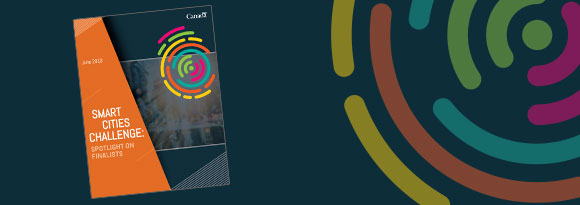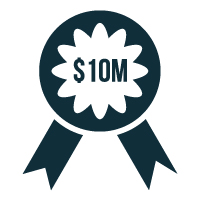Parkland, Brazeau, Lac Ste Anne and Yellowhead Counties, Alberta
This page has been archived on the Web
Information identified as archived is provided for reference, research or recordkeeping purposes. It is not subject to the Government of Canada Web Standards and has not been altered or updated since it was archived.
The first round of the Smart Cities Challenge is closed. The Government of Canada announced the four winners (City of Montréal, Québec; Nunavut Communities, Nunavut; City of Guelph and County of Wellington, Ontario; and Town of Bridgewater, Nova Scotia) on May 14, 2019.

Executive Summary
- PDF Version (367.66 KB)
- HTML Version
"We aim to transform how rural Canada uses and accesses Information Communications Infrastructure for the common good. We hope to lever the benefits of connected technologies to improve rural lives, rural economies and rural environments … True to the intention of the Smart Cities Challenge, we are focussed on delivering value that can be adopted nationwide"
– final proposal
Challenge Statement
Our agricultural community will revitalize and grow through the connection of people to the land and food while attracting citizens to share in its prosperous, innovative and resilient way of life.
Summary
This proposal has a lofty goal. The applicants seek to increase the prosperity and safety of rural communities – farm and rural residential alike – through the full use of integrated data and connected technologies. Increased rural prosperity will support more people living on farms and in rural areas. This will require greater technology adoption, proper decision support tools and market linkage between rural/farm areas and urban Canada and beyond.
The proposal seeks to build more prosperous market and knowledge links with urban Canada and beyond. Data-driven discussions will bring farmers closer to people's kitchen tables and address misconceptions about how our food is produced. We will improve the safety and security in rural areas by reducing accidents between large machinery, and improve regional security through technology adoption.
Overall, these initiatives seek to create a more prosperous and safe way of life in rural Canada. In turn, a growing population is anticipated; a greater interest in living a rural lifestyle will prompt more young people to move into farming, and incent greater inter-generational farm transfer.

Spotlight on Finalists:
Parkland, Brazeau, Lac Ste Anne and Yellowhead Counties, Alberta
Population: 61,762
Focus Areas:


Prize Category:

#smartcitiesCanada
The Jury's Perspective
Read the transcript
My name is Leanne Bellegarde. I'm from the Peepeekisis First Nation, in the File Hills Qu'Appelle Tribal Council of Saskatchewan. It's in Treaty 4 Territory. I'm the director of strategic inclusion for Nutrien. My home is Saskatoon, Saskatchewan.
The opportunity to be a jury member for "Smart Cities Challenge" is really about inspiring the future of this country and challenging Canada to be that all it can be through empowering people and communities to do what they know and do best, serve their people with a view to the future.
The Parkland "Smart Cities Challenge" is inspiring. The history of Canada is really built largely on the settlement of this land, particularly in the west for agricultural purposes and economy. And for Parkland and its proposal, it is, once again, about looking at the stewardship of the land, the food it produces, and how it nurtures us all. Through innovative technologies, they will capture data that is not only about farming innovation, sustainable land practices, but also about encouraging the future of farming through generational continuation of farming through families, not just large corporations, though those certainly play a role. They've certainly thought strategically not only about being economically viable, the consolidation of land realities, climate change, automation of farming practices, but they've also thought about the sense of community and the safety for all, because in the west it's still a geographic reality that the dispersion of farming means we're not always as close as a short walk to knock on our neighbour's door. There are other challenges and risks inherent in being dispersed through farming communities, and I hope that Parkland, through the use of the technologies and innovations it has set out, will create a broader sense of community inclusive of all of those in rural western Canada and will inspire all of Canada to enhance that sense of community as well as continue to grow food and sustain us all.
The Finalist's Perspective
Read the transcript
The smart cities challenge is a competition that called in Canadian communities to explore how data and connected technology can achieve meaningful outcomes for residence.
On screen:
Smart Cities Challenge
Winning communities
School
The finalists
$10M category: Parkland, Brazeau, Lac Ste Anne and Yellowhead Counties, Alberta
Tell us about your team and your community
Barb Scully (Connected Communities Program Manager): we're right outside of Edmonton, all four communities are adjacent to each other so for Parkland County which is ours we have a population density of 13 people per square kilometer and all four communities have a commitment to agriculture in their communities.
On screen: Why did you enter the challenge?
Barb Scully (Connected Communities Program Manager): We entered the smart cities challenge because there's a lot of really amazing things going on in agriculture, but not necessarily in our region and if they are in our region, they're in small pockets. So, if we could find ways to capture that and increase the innovation and a track pack or knowledge workforce and do some row retention especially on the youth or for youth attraction getting into agriculture.
On screen: Challenge statement: Our agricultural community will revitalize and grow through the connection of people to the land and food while attracting citizens to share in its prosperous, innovative and resilient way of life.
Join the conversation: #smartcitiesChallenge
Infrastructure Canada
- Date modified: